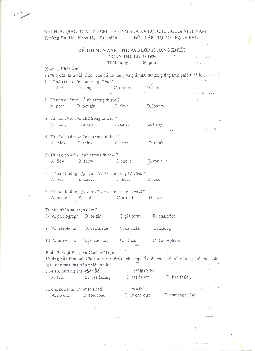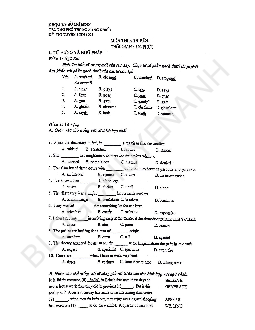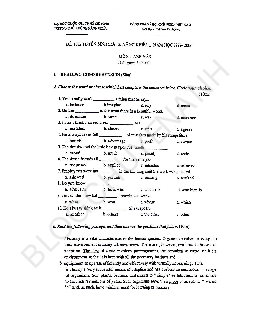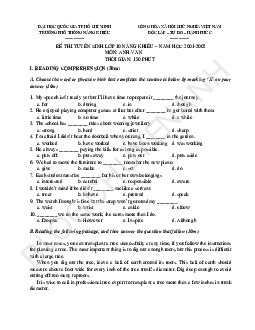











Preview text:
http://lize.vn
SỞ GIÁO DỤC VÀ ĐÀO TẠO MÔN THI: TIẾNG ANH THÁI NGUYÊN
(Dành cho thí sinh thi vào chuyên Tiếng Anh)
KỲ THI TUYỂN SINH LỚP 10 Ngày thi: 13/6/2015
THPT CHUYÊN NĂM 2015-2016
Thời gian làm bài: 150 phút SECTION A. PHONETICS
Choose the word which has the underlined part pronounced differently from that of the others. 1: A. coughs B. hopes C. thoughts D. ploughs 2: A. headache B. flame C. shame D. shadow 3: A. remote B. purpose C. control D. solar 4: A. weather B. breathe C. healthy D. although 5: A. plow B. know C. flow D. window
SECTION B. GRAMMAR AND VOCABULARY
I. Choose the correct answer A, B, C or D.
6. I don’t see any …………. in arriving early at the theatre. A. cause B. point C. reason D. aim
7. The stolen jewels were …………….. a lot of money. A. valued B. cost C. priced D. worth
8. At four o’clock Mr. Hutchinson still had some ……………. to do in the garden. A. work B. job C. effort D. task
9. He possesses all …………… makes life agreeable. A. which B. that C. what D. whom
10. When can the students ……………. for the next year’s evening classes? A. assist B. enroll C. join D. inscribe
11. My little brother enjoys ……………. museums and art galleries. A. visiting B. seeking C. travelling D. collecting
12. Everybody was surprised because he went to the party without ……………. A. inviting B. invited C. being invited D. to invite
13. In order to keep our school clean, littering is strictly ……………. A. restricted B. promoted C. prohibited D. encouraged
14. – “Could you do me a favor, please?” ~
- “………………………..” A. Let me help you. B. Yes, go ahead!
1 Ms. Ta Thanh Hien – Hanoi Unniversity – Lize.vn – H&H English Centre http://lize.vn
C. No, thanks. I’m fine
D. Sure. What can I do for you?
15. – “…………….” Stay with Vietnamese friends in the college dormitory?”
- “Sorry, but I disagree with you, Ben. There’s no chance to practice speaking English then.” A. I think B. How can we C. What about D. Why don’t we
16. Although he shouted, his words were ……………….in the wind. A. killed B. lost C. stopped D. drowned
17. The flight from Jakarta to New Delhi has been cancelled ……………. the heavy fog. A. as a result B. despite C. on behalf of D. on account of
18. What are you telling us …………… be true. It sounds too improbable. A. can’t B. mustn’t C. must not D. ought
II. Use the word given in CAPITALS at the end of each line to form a word that fits the
space in the same line. There is an example for you.
Recently I (0) DECIDED to go to evening classes twice a week. During the day I work in a
(19. secretary) ……….. agency as a telephonist. It is not a very interesting (20. occupy)
………….. and I get bored. I also got tired of coming home every evening, putting a (21.
freeze) …………… meal in the oven and then watching TV. So I decided to take up (22.
carpenter) ……………. as a hobby. Perhaps I should give you an (23. explain) …………….
for my choice. Learning a skill is a good (24. solve)……………. to the problem of boring
work. Also, I felt I was a (25. fail)…………. Because any time I tried to put up a shelf, for
example, it always fell down! Now I am quite a (26. success) ……………… wood-worker! I
am working on the (27. construct) …………………. Of some furniture at the moment. And
although there are only two other girls in the class, I don’t feel any (28. embarrass)
…………….. I’ve just turned out to be the best student in the class.
III. Complete each of the following sentences with one of the phrasal verbs given below.
Make any necessary changes. let down run down put forward look up give a way put on bear out cross out
29. I’m depending on you to pay me back the money on Monday. Please don’t ……… me ……
30. If you think I’m wrong, check the encyclopedia. I’m sure it will ……….. me ……….
31. They are very two-faced. They are very nice to her when she’s there, but they
……….her………. behind her back.
32. I’d like to ……….. a proposal. I suggest we start production in May.
33. They eat like a horse but they never ………….. weight.
2 Ms. Ta Thanh Hien – Hanoi Unniversity – Lize.vn – H&H English Centre http://lize.vn
34. The author refused to …………. any secrets about the ending of his book.
35. When I was in New York, I was able to ………….. several old friends I hadn’t seen for years.
36. If you make a mistake, just ………… it ………. SECTION C. READING
I. Read the passage and decided which answer (A, B, C, or D) best fits each blank. THE WOLFMAN
Most people would be (37) …………. with fear if they saw a wolf. But not Shaun
Ellis. Shaun, also known as the Wolfman, has been studying wolves for over 20 years.
In order to gain (38) …………….. into the behavior of these animals, Shaun spent
seven years in the USA studying wolves, and even living among them. Then in 2005, he
spent 18 months living with three young wolves at a wildlife park in the UK. Having been
born in (39) ………….., none of the wolves had ever had a chance to (40) ……………. with
other wolves. But Shaun knew a lot about wolves so he (41) …………..up with an unusual
idea: he would move in with the animals and teach them how to behave like wolves in their
(42) ……………... habitat. Not (43) ……………….., no one expected him to carry (44)
……………. His experiment successfully. However, after living with the wolves for 18
months, Shaun (45) ………………. his goal. The animals even accepted him as their leader.
Shaun’s time with the wolves and the knowledge he acquired about them has paid
(46) …………….. in another way. Shaun has been able to give (47) ……………… to
farmers on how to protect their animals from wolves that live in the (48) of their farms. 37: A. still B. terrified C. anxious D. paralysed 38: A. instinct B. insight C. experience D. view 39: A. welfare B. refuge C. care D. captivity 40: A. raise B. interact C. benefit D. react 41: A. thought B. brought C. came D. found 42: A. natural B. typical C. wild D. endangered 43: A. particularly B. indifferently
C. exceptionally D. surprisingly 44: A. out B. off C. for D. though 45. A. dedicated B. developed C. achieved D. succeeded 46: A. off B. up C. in D. out 47: A. solution B. assistance C. service D. charity 48: A. visibility B. location C. district D. vicinity
II. Fill in each numbered blank ONE suitable word.
3 Ms. Ta Thanh Hien – Hanoi Unniversity – Lize.vn – H&H English Centre http://lize.vn
STRESS AND ATHLETIC SUCCESS
Success in any field, is often a matter of how well a person is (49) ………….. to
control the amount of stress they experience. As stress increase, their performance often (50)
…………, but there is a certain point beyond which their performance begins to decline
sharply. Sports psychologists now help Olympic athletes (51) …………… others, balance the
good and bad effects of stress.
Before an athletic event, a high (52) …………….. of excitement can actually have a
positive effect on the athlete. This excitement becomes harmful, (53) …………… if negative
thoughts take over. Thoughts such as “What if I fail?” or “I know the others are better than
me” should definitely be avoided. Psychologists help athletes manage to replace negative
thoughts with positive (54) …………..
Another useful techniques before competing (55) ………….. to recognize your level
of excitement and adjust it if necessary. Music may be helpful (56) ………….. these cases. If
you are over-excited, listening to soft music can help to calm you down. If you are not
excited (57) ……….., you may want to listen to fast, powerful music to raise your spirits.
The key to success, in other words, is a person’s knowledge of their ideal level of
excitement. An imbalance either way could mean the difference (58) …………. Success and failure.
III. Read the text below and look carefully at each line. Some of the lines are correct,
and some have a word which should not be there. If a line is correct, put a tick at the
end of the line. If a line has a word that should not be there, write the word at the end of the line. COMMUNICATION
Managers spend most of their time communicating-reading, and writing (0) …and……
talking and listening-yet the evidence is that they do not always do this (00) ….V…...
as successfully. One reason that has been suggested for this is that, in the (59) …………
past, communication was regarded as a natural process, not been taught (60) …………
in any formal sense. This theory has been changing, and with the concept (61) …………
of communication as an “art” now appears regularly in the management (62) ………...
courses and seminars. Communication is probably only one of the least (63) …………
appreciated aspects of management and more and more organizations are (64) …………
realizing that effective communication involves telling staff why all things (65) ………….
are happening. This is not only helps day-to-day working but allows changes (66) ……….
4 Ms. Ta Thanh Hien – Hanoi Unniversity – Lize.vn – H&H English Centre http://lize.vn
To be introduced more smoothly, and sometimes leads to improvements for (67) ………..
being mentioned by staff. Both the morale and efficiency of an organization (68) ………..
are depend to a great extent on the abilities of its staff to communicate (69)…………..
effectively. Communication is not something that should be undertaken (70) ………….
only when trouble occurs. It should be a daily habit if the organization is (71) ………….
to run smoothly and avoid difficulties and, of course, it should be both a (72) ………….
two –way process, involving listening to as well as talking. Regular (73) ………….
Exchanges of ideas between managers and staff will help to create good teamwork.
IV. Underline one mistake in each line in the passage below and then correct it. Write
your correction on the spaces provided on the right. Number (0) has been done as an example.
The world’s oceans are so vast that they can cope with the present levels 0 …..level…..
of pollution. However, few is known about the long-term effects of 74…………...
such slow poisoning. The more serious problem of modern times is that 75…………...
man is destroyed the earth’s natural resources and transforming huge area 76 ………….
into wasteland. As the result, it is becoming extremely difficult to grow 77…………...
enough to feed the world’s rapid increased population. A way of protecting 78………….
all the wildlife in the earth must also be found as many species are in 79………….
extreme danger of disappearance complete from the face of the earth. The 80………….
dangers, however, are not confine solely the land and the sea. The smoke in 81…………
the atmosphere, for example, is increasing so many that the amount of 82………….
sunlight has been educed in many cities. Man’s whole environment is being 83…………. changed in a serious way.
V. Read the following passage and choose the correct answer to each question.
HOW CAN YOU TELL WHEN SOMEBODY IS LYING?
Psychologist Paul Ekman has made a life time study of how people act when they lie. Usually
they not only want the hearer to believe the words they are sayings; they also want to cover
up some strong emotion that they are feeling such as guilt, shame, fear, anger, pain, or even
pleasure. By noticing the contradictions between their words and their behavior, Ekman
found that he could catch them in the act of lying.
Ekman concludes that there are four kinds of behavior that can give a lie away: the liar’s
words, voice, body and face. He says that liars try hardest to control their words and face,
since they assume that that’s what listener will be paying attention to. Consequently “lie
5 Ms. Ta Thanh Hien – Hanoi Unniversity – Lize.vn – H&H English Centre http://lize.vn
catchers” should also pay close attention to the speaker’s voice and body signals, which he may forget to control.
Obviously most lies are untruth words, and it’s these words that we focus on. A common
problem for liars is keeping their story straight. As we all know, one lie leads to another, and
before the liar knows it, someone will comment, “But that’s not what you said a few minutes
ago.” A less common but more fatal give away is what’s called a “slip of the tongue,” in
which the liar accidentally tells the truth instead of the lie she intended to tell. Additionally,
frequently pauses may indicate that she is making up the story as she goes along.
The liar’s voice can also give her away, and the voice is much harder to control than the
word. When telling a lie, she may speak unusually loudly or softly, may speed up or slow
down her speed for most reliable is that when people are upset, their voices tend to become
higher. But Ekman points out that vocal changes such as these are not always signs of lying;
they simply indicated strong emotion which the person may be trying to conceal.
Somebody behaviors can be controlled, but others can’t. When telling a lie, a person may
swallow frequently, sweat, or breathe faster. Gestures can give her away: nervous gestures,
such as swinging the foot, scratching or rubbing parts off the body, or twisting the hair often
increase when a person is self-conscious or under stress. The normal gestures that usually
accompany speech are often used less when someone is lying. Or the liar may accidentally
use a gesture that contradicts her words, such as nodding “yes” while saying “no”.
84. According to paragraph 1 Ekman could catch people seeing that …………… .
A. they were showing intense emotions
B. they were hiding their real feelings
C. what they said and did disagreed
D. their behavior was unusual
85. Which of the following is NOT mentioned in the passage?
A. A liar tries to keep you from seeing his true emotions.
B. Liars make much effort to control their facial expression.
C. The listener should concentrate on what the speaker says.
D. You can catch a person lying if you know what to look at.
86. Which of the following is TRUE according to the passage?
A. Liars do their best to select the right words.
B. Liars are good at making their stories sound logical.
C. Liars take great pains to avoid a “slip of the tongue”.
6 Ms. Ta Thanh Hien – Hanoi Unniversity – Lize.vn – H&H English Centre http://lize.vn
D. Liar pause frequently to remember the details of the past events.
87. According to paragraph 4 when lying people try to ……………….. A. sound nice and kind
B. hide their frustration
C. speak faster than usual
D. look reliable to the speaker
88. Body behaviors ……………
A. are more obvious when people are nervous
B. depend on a person’s temperament
C. give away people’s intentions
D. can hardly be checked SECTION D. WRITING
I. Finish the second sentence in such a way that it has the same meaning as the one printed before it.
89. Thanks to her mother’s encouragement, she entered the beauty contest.
Had it ……………………………………………………………………….
90. She was just as good as they had thought.
She quite definitely came …………………………………………………...
91. Mary was the only student absent from class.
Apart ………………………………………………………………………..
92. The police didn’t at all suspect that the judge was the murder.
Little ………………………………………………………………………..
93. Could you guard against my handbag while I go to the toilet?
Could you keep an ………………………………………………………….
94. Now that his mother was being there, they said nothing about it.
On …………………………………………………………………………..
II. Complete the second sentence in a way that it means the same as the previous one,
using the word given. Do not change the word given. Do not use more than FIVE words.
95. According to the report, the driver of the car was a policeman. (BEING)
According to the report, the ………………………………… by a policeman.
96. Today’s meeting is postponed and it will be held next week. (PUT)
Today’s meeting has …………………………………. until next week.
97. There’s no chance of Jenny getting here on time. (POSSIBLE)
It won’t be …………………………………………… here on time.
98. In my opinion, these two kinds of music are completely different from each other.
7 Ms. Ta Thanh Hien – Hanoi Unniversity – Lize.vn – H&H English Centre http://lize.vn (COMPARISION)
In my opinion, there is …………………………these two kinds of music.
99. We discussed the problem but nobody had a solution. (CAME)
We discussed the problem but ……………………………………….. with a solution.
100. I arrived late because I missed the 10.30 train. (TURNED)
If I had caught the 10.30 train, I ………………………. Time.
GIẢI THÍCH CHI TIẾT 01. A. /s/ B. /z/ C. /s/ D./s/
Những động từ có phát âm kết thúc là k, f, t khi thêm “s” thì được phát âm là /s/ Các trường
hợp còn lại phát âm là /z/ 02. A. /ei/ B. /ei/ C. /ei/ D. / æ/ 03. A./əʊ/ B./ə/ C./əʊ/ D./əʊ/ 04. A./ð/ B. /ð/ C./ ɵ/ D. /ð/ 05. A./aʊ/ B./əʊ/ C./əʊ/ D./əʊ/
06. B. Cụm “To see the point in doing something” có nghĩa là hiểu quan điểm, mục đích, ý
nghĩa, tầm quan trọng hay lý do của một việc gì.
07. D. Worth (adj): đáng giá, trị giá
08. A. Have some work to do: còn một số việc phải làm
Những từ khác không phù hợp: job là việc làm, effort là sự cố gắng, task là nhiệm vụ
09. B. He possesses all that…: “that” là mệnh đề quan hệ, bổ sung ý nghĩa cho từ “all”. Lưu
ý, ở đây không dùng từ “which” vì nếu từ được thay thế phía trước có định ngữ là “all, every,
any, much, little, few, no” thì dùng “that” mà không dùng “which”.
10. B. To enroll for: tham gia vào, kết nạp vào, ghi tên tham gia vào
11. A. To visit somewhere: đi tham quan nơi nào đó
To enjoy + V-ing: yêu thích làm gì đó
12. C. Without+ V-ing: không làm gì đó
“without being invited”: không được mời, động từ invite được chia bị động
13. C. To be prohibited: bị cấm
14. D. “Could you do me a favor” = “Can/could you help me?”
Câu trả lời đúng là D: Chắc chắn rồi. Tớ có thể giúp gì cho cậu?
15. D. “Why don’t we…?” mang ý nghĩa như một sự gợi ý, một cách đưa ra ý kiến
8 Ms. Ta Thanh Hien – Hanoi Unniversity – Lize.vn – H&H English Centre http://lize.vn
16. D. “to be drowned”: bị nhấn chìm, bị át đi
17. D. “on account of” =”because of”: bởi vì
18. A. “can’t be true”: không thể đúng sự thật được, vì vế sau có diễn tả “it sounds too
improbable”: nó quá không xác thực xảy ra
19. “agency” là một danh từ, vì thế phía trước ta cần một tính từ
Secretarial (adj): (thuộc công việc) thư ký
20. Sau “a very interesting…” ta cần một danh từ, occupation (n): nghề nghiệp, công việc
21. “a frozen meal” ở đây ta dùng quá khứ phân từ của freeze, để diễn tả “một bữa ăn đã đông lạnh”
22. Ở đây ta cần dùng một danh từ chỉ nghề nghiệp, carpentry là nghề mộc
23. Sau “a good…” ta cần một danh từ, explanation là sự giải thích
24. Sau mạo từ “a” ta cần một danh từ, solution: giải pháp
25. Failure (n): người thất bại
26. Trước danh từ “wood-worker” ta cần 1 tính từ. Successful (adj): thành công
27. sau mạo từ “the” ta cần một danh từ. construction (n) sự xây dựng
28. sau “any” ta cần 1 danh từ. embarrassment: sự lúng túng, bối rối, ngượng
29. let somebody down: làm ai đó thất vọng
30. bear somebody (something) out: ủng hộ, xác nhận
31. run somebody down: chê bai, bôi xấu ai đó
32. put forward: đề xuất, đưa ra, nêu ra
33. put on weight: lên cân
34. give away: để lộ, tiết lộ
35. look somebody up: thăm ai sau thời gian xa cách
36. cross something out: xoá đi bằng gạch chéo/gạch ngang
37. D. to be paralysed with fear: sợ đến tê liệt cả người
38. B. insight (n) sự hiểu thấu
gain insight into: đạt được sự thấu hiểu về…
39. D. captivity(n): tình trạng bị giam cầm
40. B. interact with (v): tương tác với
41. C. come up with an idea: nảy ra 1 ý tưởng
42. A. natural habitat: môi trường sống tự nhiên
43. D. “Not surprisingly”(trạng từ): không hề ngạc nhiên
44. A. Carry out (v): tiến hành
45. C. Achieve one’s goal: đạt được mục đích
9 Ms. Ta Thanh Hien – Hanoi Unniversity – Lize.vn – H&H English Centre http://lize.vn
46. A. Pay off: mang lại kết quả tốt, thành công
47. B. Assistance(n): sự giúp đỡ
48. D. In the vicinity of something: ở vùng lân cận (nơi nào đó)
49. able.-> to be able to do something: có khả năng làm điều gì
50. improves. ở câu trước, ta có thể hiểu rằng, “thành công được thể hiện qua hiệu quả con
người kiểm soát stress.” Khi stress tăng, sự kiểm soát của họ (their performance) cũng đồng
thời được cải thiện (improve)
51. Among. Ta có: Among others: giữa những người khác. “Các nhà tâm lý trong lĩnh vực
thể thao giúp những vận động viên Olympic, giữa những người khác, cân bằng những ảnh
hưởng tốt lẫn xấu của stress.”
52. level. Ta có: A high level of excitement: một mức độ phấn khích cao
53. though. Ta có: “this excitement becomes harmful, though if negative thoughts take
over.”: Sự phấn khích này có thể gây hại, ngay cả khi những suy nghĩ tiêu cực chiếm ưu thế.
54. ones/ thoughts. Câu này dễ dàng điền đáp án, vì phía trước đã nhắc đến “negative
thoughts”, chúng ta chỉ cần điền cụm tương tự vậy: positive thoughts/ones
55. is. Đây là sự chuyển ý. Bắt đầu bằng “Another…” và phía sau là “to regconize” nên chỗ
trống này chúng ta cần một động từ to be. Đáp án là “is” vì “another useful technique” là số ít
56. in. Danh từ case (trường hợp, vụ,…) đi với giới từ “in”.
57. enough. Ta có: Adj+enough: đủ tính chất/trạng thái gì đó. “excited enough”: đủ phấn khích
58. between. Ta có: “between something and something”: giữa cái này với cái khác
59. Thừa từ “as”, từ này ở đây không có tác dụng ngữ pháp cũng không có tác dụng về nghĩa
60. Thừa “been”. Vế trước đang tồn tại dạng bị động quá khứ “was regarded” nên vế sau chỉ
cần “not taught” là được
61. Thừa “with” vì nó không có ý nghĩa gì trong câu này
62. Thừa mạo từ “the”. “courses” được chia số nhiều, nên chỉ cần “in management courses”,
không cần mạo từ “the”
63. Thừa “only” vì phía sau có ghi “one of the…aspects”. Tức là “Communication” là một
trong những khía cạnh, chứ không phải duy nhất. ngoài ra nếu ở đây dùng thêm “only” thì về
mặt nghĩa không phù hợp 64. Đúng
65. Thừa “all”. Nếu sử dụng từ “all”, ta có thể dùng là “all of things” hoặc “all the things” 66. Đúng
10 Ms. Ta Thanh Hien – Hanoi Unniversity – Lize.vn – H&H English Centre http://lize.vn
67. Thừa “for”. Từ này không ở đây không mang ý nghĩa liên quan cũng như ngữ pháp cũng không đúng 68. Đúng
69. Thừa “are”. Động từ to be và động từ nguyên thể không bao giờ đi cùng với nhau, vì thế không có “are depend” 70. Đúng 71. Đúng
72. Thừa “both”, vì “both” luôn đi kèm với “and” nhưng ở vế sau không hề có “and” mà chỉ
có 1 danh từ (a two-way process)
73. Thừa “to”. Ta sử dụng “listen to something” nhưng ở phía sau không có danh từ
(something). Hơn nữa, “listening” ở đây là một danh từ, mang nghĩa là sự lắng nghe
74. Sai ở từ “few”, “few” dùng đi kèm danh từ đếm được, ở đây ta dùng “little”
75. Sai ở “more”, “more” dùng để so sánh giữa các vật, nhưng ở đây không có so sánh. Ngoài
ra, trước “more” có “the”, vì thế ta có thể sửa thành “the most”
76. Sai ở destroyed. Đây không phải bị động, mà là hành động con người đang tàn phá thiên
nhiên, có thể sửa lại thành “destroying”
77. Sai ở “the”. “as a result” là một cụm cố định chỉ kết quả
78. Sai ở “rapid”. Ở đây ta cần một trạng từ, vì phía sau đã có “increased population”. Sửa lại thành “rapidly”
79. Sai ở “in”. “the Earth” đi với giới từ “on”
80. Sai ở “complete”, ở đây ta cần sử dụng một trạng từ. sửa lại thành “completely”
81. Sai ở “confine”. Động từ tobe không đi cùng với động từ nguyên thể. Sửa lại thành “confined”
82. Sai ở “many”. “The smoke” là danh từ không đếm được, ta sửa lại thành “so much”
83. Sai ở “educed”. Sai về nghĩa. Sửa lại thành “reduced”
84. C. what they said and did disagreed
Câu cuối đoạn đầu tiên: “By noticing the contradictions between their words and their behavior,…”
85. C. The listener should concentrate on what the speaker says. Các câu A, B, D đều được
nhắc đến trong bài ở câu thứ 2 và thứ 3 của đoạn văn 2.
86. A. liars do their best to select the right words. Đáp án này có thông tin tại câu thứ 2 của
đoạn 3: “…liar is keeping their story straight”
11 Ms. Ta Thanh Hien – Hanoi Unniversity – Lize.vn – H&H English Centre http://lize.vn
87. C. speak faster than usual. Thông tin tại câu thứ 2 của đoạn 4: “When telling a lie,
she…may speed up her speed..”
88. D. can hardly be checked. Thông tin của đáp án được tìm thấy tại 2 câu cuối của bài. Các
dấu hiệu thông thường dùng để phát hiện nói dối ít xuất hiện hoặc xuất hiện mang tính trái
ngược, do đó rất khó để kiểm tra
89. Had it not been for her mother’s encouragement, she wouldn’t have entered the beauty
contest. Cấu trúc “Had it not been for…” = “If it hadn’t been for…” = Thanks to: nhờ có…mà…
90. She quite definitely came up to their expectation. Ta có: Come up to somebody’s
expectation: được như mong đợi của ai
91. Apart from Mary every student was present in class. Ta có: Apart from
someone/something: (ngoại) trừ ai đó/cái gì
92. Little did the police suspect that the judge was the murder. Cấu trúc đảo ngữ, đảo trợ
động từ “did” lên trước chủ ngữ, sau đó dùng động từ nguyên thể
93. Could you keep an eye on my handbag while I go to the toilet? Cấu trúc: Keep an eye on
something: để ý đến cái gì
94. On account of his mother was being there, they said nothing about it. Ta có: “on account
of” = “now that”: bởi vì
95. According to the report, the car was being driven by a policeman. Đây là cấu trúc bị
động của thì quá khứ tiếp diễn
96. Today’s meeting has been put off until next week. Ta có: “put off” = “postpone”: hoãn lại
97. It won’t be possible for Jenny to get here on time. Ta có: To be possible for somebody
to do something: có khả năng cho ai làm cái gì
98. In my opinion, there is no comparison between these two kinds of music. Ta có: “there
is no comparision” = “completely different”: hoàn toàn khác biệt
99. We discussed the problem but nobody came up with a solution. Ta có: “come up with
something”: nghĩ ra điều gì đó
100. If I had caught the 10.30 train, I would have turn up on time. Ta có: “turn up”: xuất hiện, đến, tới
12 Ms. Ta Thanh Hien – Hanoi Unniversity – Lize.vn – H&H English Centre




